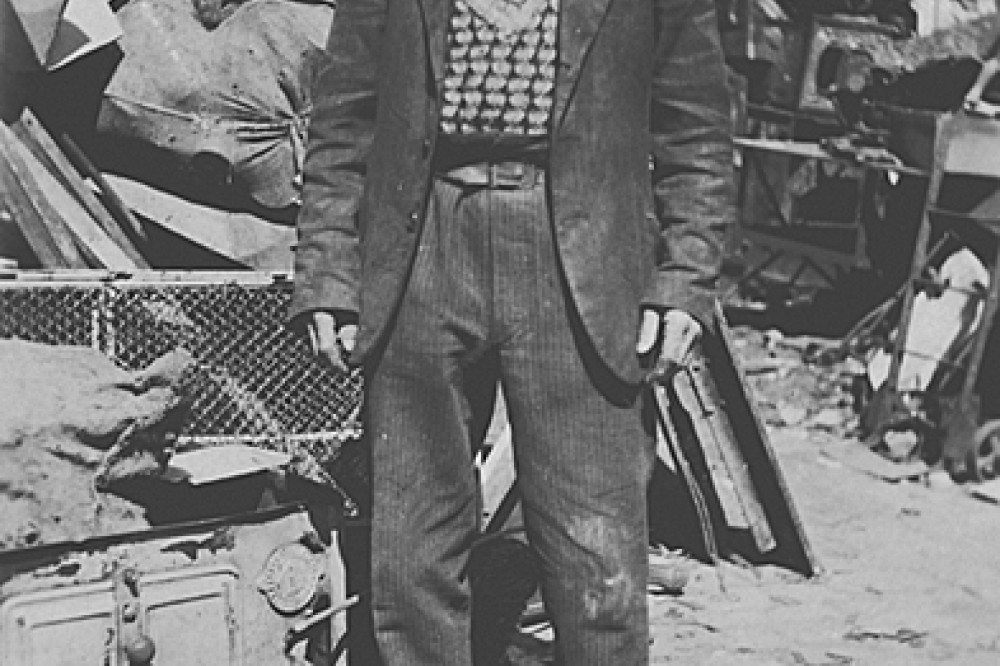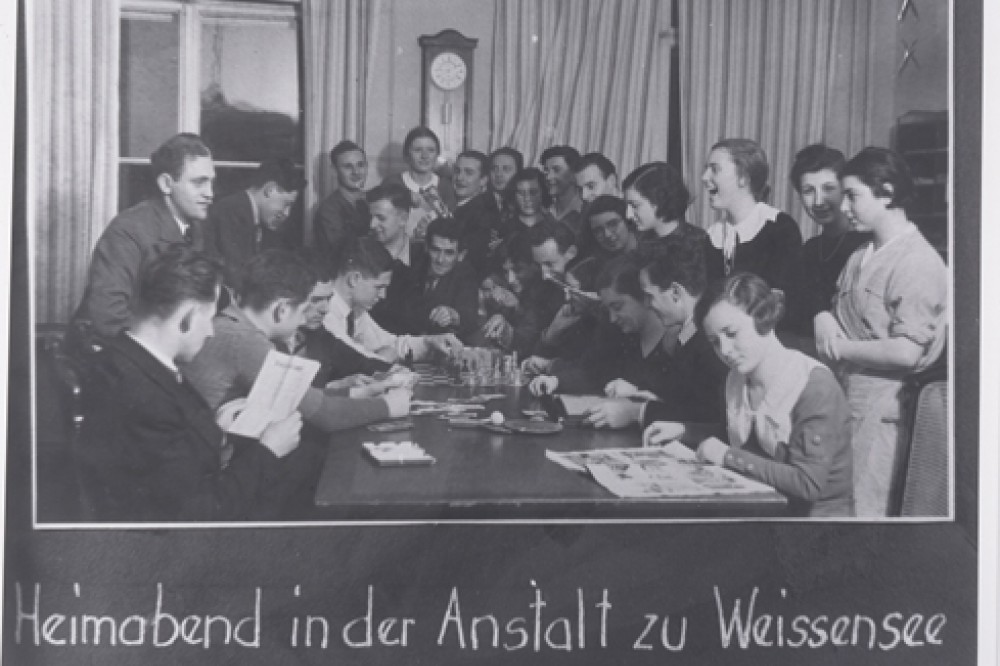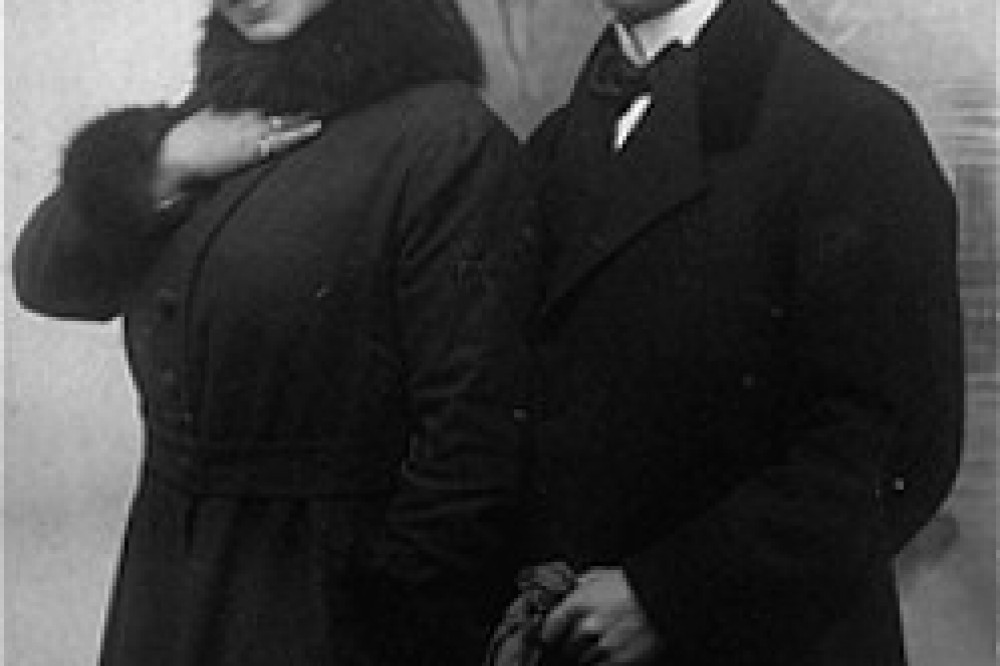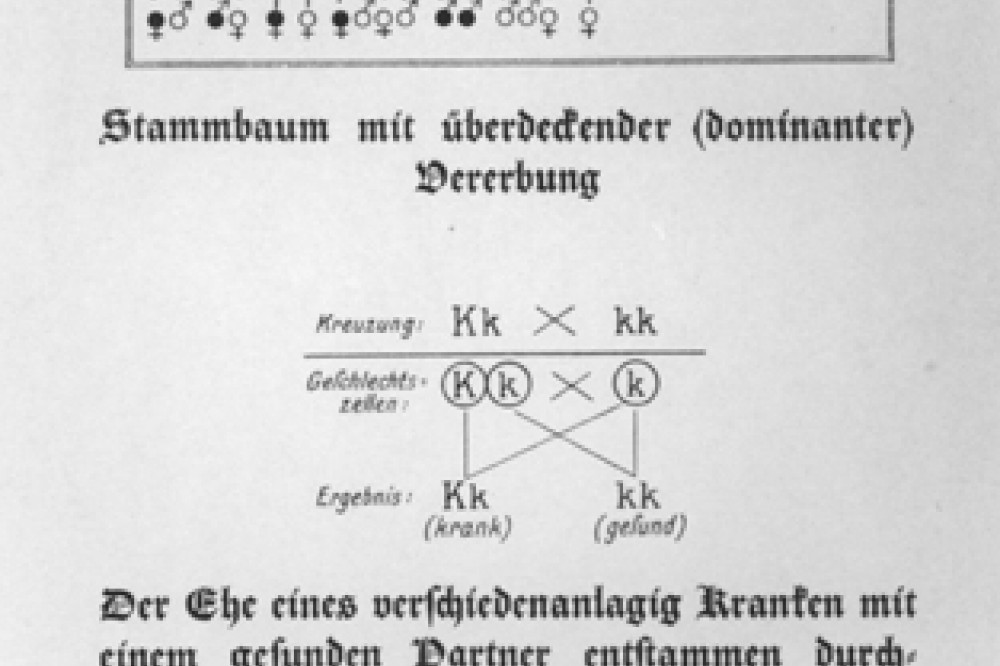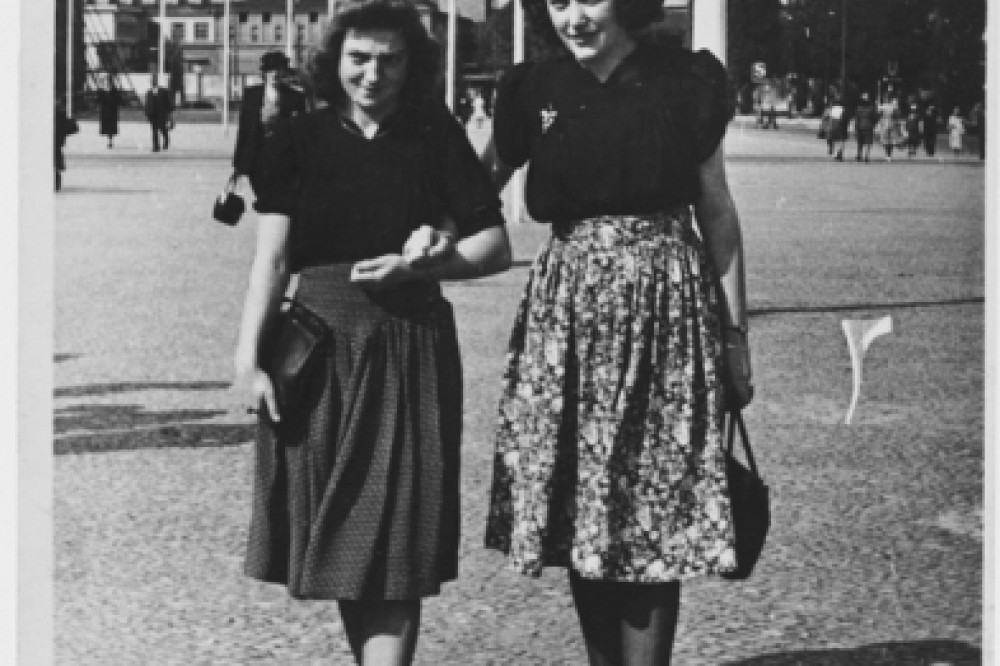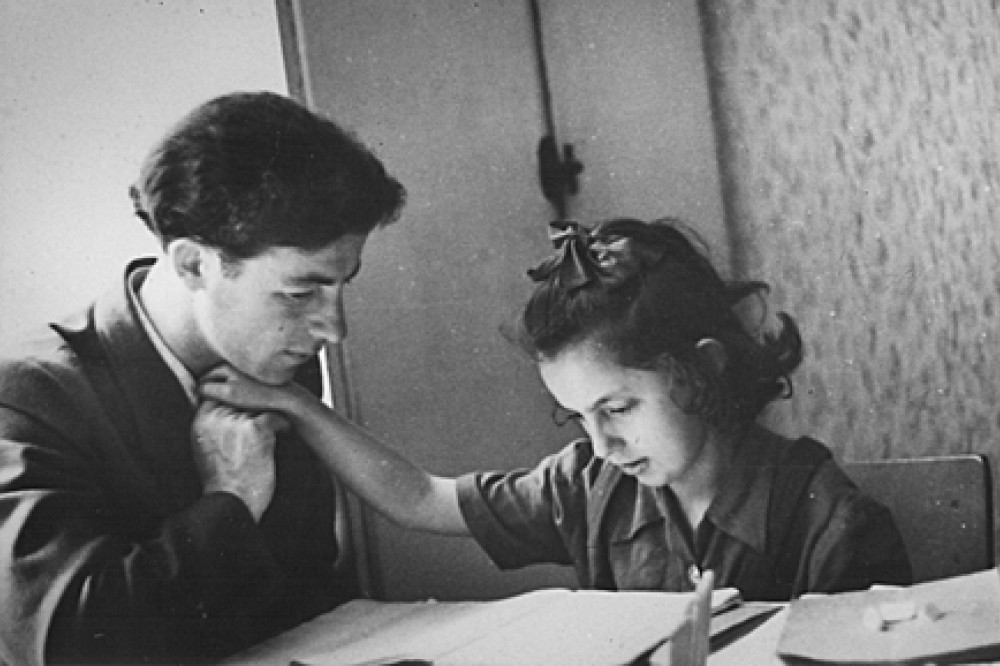Holocaust
- RIT/
- Deaf People and World War II/
- Deaf People/
- Holocaust
The Holocaust / Shoah
The numbers of Deaf Jews who perished in the Final Solution is unknown. It is very clear that it was rare for a Deaf Jewish person to be able to survive. Some of the stories of Deaf Jewish survivors that have been preserved are of those who were able to flea Europe before the height of the Holocaust, went into hiding, or endured labor camps. Very few Deaf Jews who were in concentration camps or death camps lived to tell of it. You can read about individual survivors, stories here and/or view their videotaped testimonies.
Rescuers
While many gentiles and able bodied people turned their backs on Deaf people and Deaf Jews, we know of a few stories of people who risked their lives to hid and help Deaf people during this time. There are sure to have been many more but these stories still need to be uncovered.
Survivors
- PowerPoint Megan Buckalew, NTID/RIT, Fall 2006
- Deaf Americans Article
- “Inside the Madness: A Deaf Survivor Remembers the HOLOCAUST,” an article by Vickie Walter (PDF)
- SHOAH Foundation Video: Part 1| Part 2
Videotape testimony of David B., who was born in Floss, Germany in 1910. He relates being orphaned at a young age; his first five years in a happy household of relatives; attending a school for the deaf in Munich (he was not born deaf) from ages five to thirteen; schools in Jena for two years; his older siblings’ emigration to Israel and the United States in 1935; training as a porcelain decorator; work as a designer in Floss; loss of his job due to Nazi restrictions; returning to Munich in 1938; Crystal Night; and internment in Dachau. Mr. B. describes camp life; release four weeks later; work in Munich; a cable from his brother in the United States instructing him to go to Shanghai; leaving six weeks later; arrival on May 9, 1940; conditions of ghettoization, hunger, epidemics, and bombings; working as a lithographic artist; marriage to a Chinese woman; and emigration to the United States in 1949. Mr. B. discusses his extensive art work based on the Holocaust (many have been donated to YIVO and Leo Baeck); his sense that his art tells his story much better than words; and reluctance to tell his children of his experiences.
© Yale Fortunoff Video Archives
- NTID video: Bloch Interview with S Carmel
- Hey, Listen Video: Bloch – Panelist
- Search for Vision Video: David Bloch
- Petersen Collection
- Excerpt from A Mission in Art: Recent Holocaust Works in America
- SHOAH Foundation Video: Part 1 | Part 2 | Part 3 | Part 4
- PowerPoint Amy Holcomb, NTID/RIT, Spring 2007
- Hearing Survivor of Deaf Parents
- SHOAH Foundation Video: Part 1 | Part 2 | Part 3 | Part 4
Videotape testimony of Morris F., who was born in Łódź, Poland in 1918. He recalls a serious illness and hospitalization; waking up deaf; becoming very depressed; not being able to attend school;living; moving to Tel Aviv with his family; returning to Łódź due to harsh conditions; fear after German invasion; ghettoization; forced labor as a tailor; his parents not returning home; separation from his brothers (he never saw them again); deportation to Auschwitz; hiding his deafness; responding to vibrations and following others; slave labor on farms; transfer to Dachau; liberation from a barn by United States troops; hospitalization in Munich; living in Landsberg and Salzburg displaced persons camps; teaching himself German; obtaining work as a tailor in Salzburg; obtaining papers for emigration to the United States from an American general for whom he made a suit; working in a clothing factory, then as a pattern designer; marriage; and his son’s birth. Mr. F. discusses frequent beatings and pervasive killings in camps and trying not to bring back those terrible memories, but despite that, sharing his story today for his son’s family.
© Yale Fortunoff Video Archives
Videotape testimony of William F., who was born deaf in a small town near Sátoraljaújhely, Hungary, in 1910. Mr. F. describes his childhood in a large family (two brothers were also deaf); learning from his father to read Hebrew for his bar mitzvah; being self-taught because he lacked a formal education; becoming a leatherworker; his pride at living independently in Budapest at age eighteen; growing anti-Semitism; fleeing to Czechoslovakia in late 1937; courtship and marriage; and establishing a business in Piestany. He recalls a Christian maid who helped him and his wife avoid deportation in 1940; escaping to Romania and then Yugoslavia; boarding a ship with 1200 Jews fleeing to Palestine; being shipwrecked on an uncharted Aegean island; rescue by an Italian ship; detention in camps on Rhodes and another island; surviving a bomb attack; liberation; and an army captain who helped him and his wife travel to America in 1944. He relates internment in Oswego; learning of the loss in Europe of nearly all his family; a wealthy Hungarian immigrant who helped them remain in America after the war; reunion with his sole surviving sister in Israel in 1963; his second marriage; moving to Israel in 1972; and returning to America after the Yom Kippur War of 1973.
© Yale Fortunoff Video Archives
Videotape testimony of Henry F., who was born in Meerholz, Germany in 1919. He recalls his father, a kosher butcher, his mother, a dressmaker and an older brother; attending a Jewish school for the deaf in Berlin from the age of five for ten years; Nazi harassment; graduation in 1935; and apprenticeship to a tailor in Frankfurt, despite his desire to become an engineer, because of anti-Jewish restrictions. He describes his brother’s emigration to the United States in 1937; knowing many deaf people who were sterilized by Nazi law; moving to Mannheim; difficulties obtaining documents (he shows his exit document); emigration to the United States; work in a defense plant; learning English and English sign language; learning the print trade after the war; marriage; and his children and grandchildren. Mr. F. emphasizes the importance of future generations learning about events in Germany and shows a photograph of his class from the Jewish school for the deaf of whom only two (including himself) survived.
© Yale Fortunoff Video Archives
Videotape testimony of Lore F., who was born in Thüngen, Germany in 1931. She recalls pleasant memories as the only child in a wealthy home; fond relations with cousins; brief attendance at a school for the deaf in Berlin; withdrawal from school after a few weeks because her mother thought she was too young; return to school in 1937 for six months; and withdrawal again because of rumors that handicapped people were being sterilized. Mrs. F. describes observing expressions of fear everywhere; neighbors being taken to jail; her father’s emigration to the United States; a physical examination to obtain exit documents in which she did not speak at all in order to hide her deafness from the doctor; the ship journey at age six during which she also hid her deafness; and relief at arrival because she could finally speak. Mrs. F. discusses the importance of telling her story, especially for deaf people to realize the treatment of the handicapped by the Nazis; relating her experiences to her children; and anticipating telling her grandchildren.
© Yale Fortunoff Video Archives
- “Fred Fedrid,” JDCC article
- “Doris Fedrid,” JDCC article
 This metal pin was worn by Siegried (Fred) Fedrid in a Displaced Persons (DP) camp after the war. The pin bears his number and is imprinted with the word “Taubstumm” meaning “deaf and dumb.” It is unclear whether Fred received this pin from soldiers while in Dachau, or if he or American liberators or another deaf person fashioned the pin for him. This pin is on loan to WSHERC from his family.
This metal pin was worn by Siegried (Fred) Fedrid in a Displaced Persons (DP) camp after the war. The pin bears his number and is imprinted with the word “Taubstumm” meaning “deaf and dumb.” It is unclear whether Fred received this pin from soldiers while in Dachau, or if he or American liberators or another deaf person fashioned the pin for him. This pin is on loan to WSHERC from his family.
No copy, image, or illustration of this pin may be used without the expressed written permission of the Washington State Holocaust Education Resource Center and Eleanor Corner.
Image and captions appear courtesy of the Washington State Holocaust Education Resource Center (WSHERC) and Eleanor (Fedrid) Corner.
- “Lotte Friedman,” Temple Beth Solomon of the Deaf article
- “Book Review” of Anna Heilman. Never Far Away. The Aushwitz Chronicles of Anna Heilman
- “PowerPoint” Amy Holcomb, NTID/RIT, Spring 2007
Herta
Videotape testimony of Herta M., who was born in Bratislava, Czechoslovakia in 1935. She recounts her grandfather’s, parents’ and her deafness; not attending a school for the deaf in Vienna due to the Nazi regime; being sent with her older, hearing sister, posing as non-Jews, to a farm owned by deaf people; being returned to Bratislava; learning their parents had been deported (they never saw them again); being sent elsewhere, then to Bergen-Belsen; her sister biting a doctor who wanted to separate them; piles of corpses; encouraging her sister when she had given up hope; caring for her when she was ill; sometimes playing with other children; loneliness despite her sister’s efforts to communicate with her; liberation by British troops; transfer to Sweden; attending a school for the deaf in Stockholm, her first educational and peer experience; assistance from the Red Cross; emigration with her sister to the United States in 1948 to join relatives; attending the Lexington School for the Deaf; marriage to a man she met there; the births of three deaf children; her husband’s death; remarriage; and her second husband’s death. Ms. M. discusses nightmares and fears of losing her children due to her experiences, and finding some peace after visiting Bratislava with her sister and son.
Associated material: Renée H. Holocaust testimony [sister] (HVT-50), Fortunoff Video Archive for Holocaust Testimonies, Yale University Library.
2 copies: Betacam SP master; and 1/2 in. VHS with time coding
© Yale Fortunoff Video Archives
Renee
Videotape testimony of Renee H., who was born in Bratislava, Czechoslovakia, in 1933. She recalls her childhood in German-occupied Bratislava, where, as the “ears” of her deaf parents and younger sister, she gathered information and alerted them to immediate dangers. She speaks of her and her sister’s flight from Bratislava and hiding with a farm family; the ordeal of finding shelter after being evicted from the farm following their parents’ deportation; and their voluntary surrender to the police in hopes of locating their parents. She relates her disappointment when she and her sister were sent from the transit camp in Sered, to Bergen-Belsen, instead of to Auschwitz, where she had hoped to be reunited with her parents. Mrs. H. describes her life in Bergen-Belsen, where she and her sister, whom she made every effort to protect, remained until their liberation a year later; her postwar recuperation in Bergen-Belsen and in Sweden; and her adjustment to her new life after emigrating to the United States. Other topics discussed include her views on the relationship between the past and the present and the importance of her writing.
© Yale Fortunoff Video Archives
- “Herta Gross Rothenberg Myers,” JDCC Article
- “Ingelore Herz Honigstein,” summary of NTID/RIT Deaf Survivors Interview Series
- Video: Ingelore Honigstein at NTID
- Video: Interview with Frank Stiefel, son of Ingelore Honigstein
- Hungarian Survivors Testimonies from GU Press
- “Esther Rosen Landman,” JDCC Article
Videotape testimony of Meta N., who was born in Oberdorf, a small town near Stuttgart, Germany in 1915, and who became deaf at the age of two. Mrs. N. discusses the emigration of her brothers to the United States before 1941; daily life in Oberdorf between 1937 and 1941; and her deportation by cattle car to Riga/Jungfernhof, Latvia, in November, 1941. She tells how she succeeded in hiding her deafness from guards and officials, once escaping a selection of deaf and other handicapped people, and how, knowing she was deaf, other prisoners helped her. She recalls the move from Jungfernhof to Kaiserwald in 1943, then to Stutthof/Danzig in 1944; being sent as a slave laborer to Korbin, Poland, where, near the battlefront, they slept in tents in the middle of winter; liberation by the Russians; and being sent to Bromberg, Poland, where she remained until the end of the war. Mrs. N. also speaks of her emigration to the United States in 1946; the tearful reunion with her siblings; her marriage in 1949; her children and grandchildren; and her desire to forget about the past.
© Yale Fortunoff Video Archives
- “A Mother’s Courage Defied the Nazis,” from Silent News
- “Pre-Holocaust Experience with a Deaf Jewish Family,” by Lilly Rattner Shirey
- Video: “Exodus: A Deaf Jewish Family Escapes the Holocaust,” Lilly Rattner Shirey talks about her family’s escape from Nazi occupied Austria.
- PowerPoint Megan Buckalew, NTID/RIT, Fall 2006
- “Rose Steinberg Feld Rosman,” JDCC Article
- “Rose’s Story,” from Temple Beth Solomon of the Deaf
- “Deaf People in the Holocaust,” Lexington Booklet p. 11
- SHOAH Foundation Video: Part 1| Part 2| Part 3| Part 4
- “Joseph Schertz,” JDCC Article
- “Marion Schlessinger Intrator,” JDCC Article
- “Marion’s Story,” from Temple Beth Solomon of the Deaf
- Video: “Marion Intractor: Interview with Evelyn Preston“
- “Deaf People in the Holocaust,” Lexington Booklet p. 11
- Deaf Mosaic Video: Stanley Teger
- NTID Video: Teger Interview with S Carmel
- Hey, Listen Video: Teger – Panelist
- “Mother’s Memoirs“
- “Images of Darkness, Flickers of Light,” an NTID Focus Magazine Article
- NTID Video: Wurmfeld Interview w S Carmel
- Deaf Esprit excerpt “Frieda and Me”
Videotape testimony of Hilda R., who was born deaf in Vienna, Austria in 1904. She recalls her family; starting work at age sixteen as a seamstress; her marriage to a deaf man; her two daughters; her husband’s neglect of the children because they were deaf (he had hoped for hearing children); their divorce; emigration to the United States in 1940 with assistance from a brother already there; having to remain at Ellis Island because they were deaf; and assistance received from the New York Society for the Deaf. Mrs. R. discusses her strong faith in God; gratitude to the United States; visiting her sister in Israel; and her daughters and grandchildren.
Associated material: Nelly M. Holocaust testimony [daughter] (HVT-694), Fortunoff Video Archive for Holocaust Testimonies, Yale University Library.
3 copies: 3/4 in. master; 3/4 in. dub; and 1/2 in. VHS with time coding.
© Yale Fortunoff Video Archives
Videotape testimony of Nelly M., who was born deaf in Vienna, Austria in 1929. Mrs. F. describes her household comprised of her deaf uncle, mother, and younger sister, and her hearing grandmother; attending a school for the deaf at about age three; learning to read lips; and her mother’s divorce (her father was deaf). She recalls the Nazi arrival in Vienna; being forced to leave school; teachers advising her mother to leave Austria; seeing signs in parks and movies reading “Jews forbidden”; an assault by a Nazi youth; witnessing the public humiliation of older Jewish men; learning to read English; emigration through Genoa, Italy to the United States; their joy at seeing the Statue of Liberty; a five month incarceration at Ellis Island because four of the family members were deaf; assistance received from the New York Society for the Deaf; attending the Lexington School for the Deaf and Hunter College; marriage; her two children; and her son’s interest in her experience. She relates learning of her father’s deportation to Minsk after the war (he never returned).
Associated material: Hilda R. Holocaust testimony [mother] (HVT-695), Fortunoff Video Archive for Holocaust Testimonies, Yale University Library.
3 copies: 3/4 in. master; 3/4 in. dub; and 1/2 in. VHS with time coding.
© Yale Fortunoff Video Archives
Rescuers
Reich, Felix
- “Deaf Jewish survivor recalls life in Nazi Germany,” an article by Todd Byrd
- Article about Markus and Felix Reich and the Jewish School for the Deaf in Berlin by Nicola Galliner
Weidt, Otto
- Bio from Jewish Virtual Library
- “Otto Weidt” from The International Raoul Wallenberg Foundation
Recommended Reading
- Crying Hands: Eugenics and Deaf People in Nazi Germany by Horst Biesold
- Deaf People in Hitler’s Europe edited by Ryan and Schuchman
- “Genocide and Deafness,” an article by Stephen C. Baldwin
- “In the Night: Deaf People in Nazi Germany,” a Deaf Mosaic video
- “In Der Nacht,” a Gallaudet Today article (PDF)
- “Deaf People in Hitler’s Europe,” a Gallaudet Today article by Laura-Jean Gilbert
- “Deaf People in the Holocaust” booklet
- “Visual Histories: Recording, Preserving, Disseminating and Analyzing Deaf Stories” by Patti Durr
- “Deaf Victims of the Holocaust” honors thesis by Volper

